Women in politics are a crying bore
The solution is to end the use of femininity as shield or sword
Recently, a friend sent me a news article that illustrates, in small, the world of Anglophone politics, in which notions of what is owed to women, who are understood to be far more sensitive and fragile than men, operate alongside stern interdictions against stating that women are in any manner unsuited for strenuous, high stress roles.
Last week, an ABC News report detailed years-old allegations against a former aide to Josh Shapiro, the Governor of Pennsylvania who was, at the time of the article, one of Kamala Harris’s touted VP possibilities (she has since chosen Tim Walz, Governor of Minnesota). Shapiro’s former staffer, Mike Vereb, who resigned in 2023 over a sexual harassment allegation, is said to have brought a woman to tears in 2018 with threats made over the phone (“You will be less than nothing by the time Josh and I get done with you,” he is alleged to have said).
The woman, who runs an advocacy group, was left “weeping and in shock standing alone in a parking lot.” She did not report the alleged incident until she heard about the aide’s resignation five years later.
Naturally, the possibility that the (anonymous) woman exaggerated or misremembered, or even fabricated, the aide’s comment, or was herself aggressive or threatening in their exchange, is not considered in the article.
But what had any of it to do with Josh Shapiro in August, 2024? Various commentators laid out the implications of his failure to protect the woman. “Critics say the allegations against [the aide] raise questions about whether Shapiro should have known about his alleged behavior and worked harder to prevent it.” A Republican state representative said she thought it likely he did know and tacitly approved, allowing Vereb to be his enforcer.
One Democratic candidate went further to suggest the incident showed Shapiro as ill-equipped to work with women generally, perhaps because of a macho complex, and therefore likely to undermine Harris if chosen: "I want a VP pick,” she tweeted, “that's secure enough to be second under a woman, is content to be VP & won't undermine the President to maneuver his own election & doesn't sweep sexual harassment under the rug.”
With the staffer long gone from Shapiro’s administration, the story had legs only because it was about a man who made a woman cry.
The problem is that women do cry rather frequently in politics. And complain. And perform their sensitivity to criticisms, monikers, crude jokes, the faux terror of J6, and bantering innuendo. Far too often such women make politics about them as women and about the trouble men allegedly cause them.
Such was the case with Australian Prime Minister Julia Gillard, who earned plaudits from feminists in 2012 for a fury-filled speech in the House of Representatives about sexism, in which she accused the opposition leader of misogyny for a number of statements he’d made that were not at all misogynistic, including that women were likely under-represented in Australian institutions of power because men were “more adapted to exercise authority.” Gillard also said she was “personally offended” (a more serious state of affairs, one assumes, than simply being “offended”) by the opposition leader’s contention that abortion was “the easy way out.” (The text of her speech is here.) “Julia Gillard’s Attack on Sexism Hailed as Turning Point for Australian Women” ran one enthusiastic headline. And perhaps it was, signaling the point at which women in politics stopped thinking they should accommodate themselves to the rigors of public life, and decided that politicians must instead accommodate themselves to the rigors of women’s demands.
Even seemingly tough-as-nails Hillary Clinton has been allowed to go from interview to interview revisiting the now years-old indignity of her election loss in 2016, like a once-popular debutante who can’t believe she didn’t make the cheerleading squad. No man would ever be given such a prolonged pity party. Having contended for years that it was misogyny that prevented her from beating Donald Trump, she more recently pointed her finger at female voters’ failures of confidence: “They left me [in the final days of the campaign] because they just couldn’t take a risk on me, because as a woman, I’m supposed to be perfect,” she explained in May, 2024. No one seems to have informed Clinton that nothing reveals her crippling unsuitability for leadership than her embarrassing refusal to stop feeling sorry for herself.
And she is, alas, far from unique. Nicola Sturgeon, former First Minister of Scotland, sat and sobbed at last winter’s Covid-19 Inquiry in Edinburgh, deflecting critical questions about her government’s actions during the pandemic by proclaiming that she would carry the impact of them for as long as she lived. Forget the thousands of Scots who suffered or even died because of those decisions: the woman in charge was the one in need of compassion. Sturgeon had previously made a career of complaining about the sexism that allegedly put obstacles in the way of female politicians. Her focus on her own emotional discomfort at the Covid inquiry did more than any naysayers to indict the feminine style. How refreshing if either of these women could simply accept responsibility for their failures.
The standard narrative is that women don’t fail in politics: politics fails them. They are scrutinized too critically and held to double standards. They are not recognized as fully as they deserve for their (alleged) feminine virtues: they are more empathetic, more authentic, better able than men to negotiate, to be diplomatic. New Zealand Prime Minister Jacinda Ardern has sounded this note, and had it sounded about her, from the beginning of her career to the end. What she did well, she did well as a woman—compassionate and generous in spirit; what she did not do well was the fault of misogyny in politics. When she stepped down after six years as leader, citing exhaustion, commentators said it showed what a toll the work took on her as a woman. No one, of course, said that her relatively short tenure indicated that as a woman, she didn’t have the necessary stamina and drive for the job, or that specific policies had made her unpopular.
This is the “Heads I win, tails you lose” feminist logic of anti-sexism, in which it is forbidden to criticize a woman as a woman in any manner or even to open oneself to the charge that one has made assumptions based on a female politician’s sex—as when Ardern sharply rebuked as sexist (and was congratulated for rebuking) a reporter for questioning her meeting with Finnish Prime Minister Sanna Marin, though he had not mentioned the sex of the two leaders—yet in which it is perfectly acceptable for the women to talk about their specific challenges as women as well as to ride on waves of positive associations with female leadership. During the Covid pandemic, dozens of articles trumpeted women’s alleged superior leadership style and results (see, for example, here, here, here, here, here, here, and here).
The dynamic will continue if Kamala Harris is elected president in November, as has been evident from the moment she became the presumptive nominee, when AP News stressed how important it was for her to become a role model for “little Black and brown girls who so often feel overlooked and undervalued in their communities.” If we care about the dashed hopes of these girls, we must not only elect Harris but must protect her from the sexism and racism that will be coming her way. USA Today was already on offense, claiming that Trump’s questioning of Harris’s blackness “used racist rhetoric,” and scolding conservatives for referring to Harris as a DEI candidate. Calling someone a DEI candidate, the paper explained, is an attempt to “disqualify people of color or women who ascend to positions of power or influence.” It was never any secret that Harris, daughter of a South Asian mother and a father of mixed race—and thus not black by any ordinary definition—was chosen as Joe Biden’s running mate because Biden was being pressured to pick a woman of color, preferably a black one. While it was not sexist and racist to choose Harris for her race and sex, it is sexist and racist to acknowledge the fact.
Failure to elect Harris will, of course, be taken as proof positive of the country’s “woman problem,” as was signaled in a recent article, “Kamala Harris: why does the US struggle with the idea of a woman leader, when other countries don’t?” The article noted that “while more than half of respondents (54%) said the US was ready to elect a woman as president, the number was down from 2015” when 63% said it was. Tsk, tsk. Perhaps some percentage of Americans have been put off by the plethora of excuses and abundant self-pity that surround most female leaders.
Some benighted souls may even be under the illusion that voting in Harris will lay to rest all the blather about misogyny (it won’t—quite the opposite).
But if there really is skepticism or hesitation about female leaders among some voters, it could be simply addressed. And all it would take would be for female politicians to be willing to forego the false praise and undeserved sympathy that their womanhood elicits. Moreover, their stance would be a true blow for equality.
Imagine a female politician who would turn in her woman card from the start, pledging never to use it: never to cry, never to damsel, never to be overcome by emotion, never to champion her woman’s wisdom or lived experience or special empathy. This person would consider it beneath her to use any aspect of her femininity for political advantage or excuse. She would not hide behind personal offence or outrage on behalf of womanhood. In particular, she would refuse to attack male opponents with charges of sexism, privilege, harassment, or indifference to women’s plight. She would not belittle male politicians for alleged masculine insecurity or excess testosterone—or any of the other contemptuous anti-male claims that women typically make and for which they are excused.
It would be even better if this woman showed herself capable of empathizing with men and boys, seeing them as constituents for whom her concern should be just as great as for women and girls. It would be superb if she could recognize some of the damage that has been done to men and boys by decades of feminist law-making, rhetoric, and public policy—and indeed by the simple bigotry of casual anti-male animus. It would be wonderful if she would refrain from assuming that victims of intimate partner violence are always female, perpetrators always male. It would be exhilarating if she felt in her bones the shocking injustice of MeToo accusations or the biased family court system.
The latter insights, alas, are almost certainly asking too much.
But expecting a female politician to permanently retire her woman card, with its predictable tears and complaints, its feminine outrage and tremblings, should be a minimal requirement for any woman seeking office, especially the highest in the land.
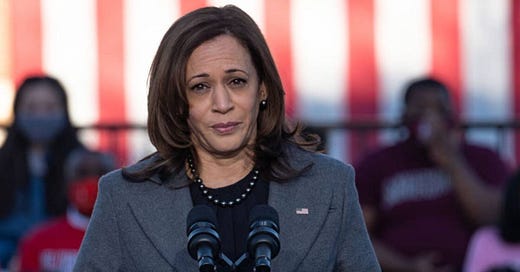



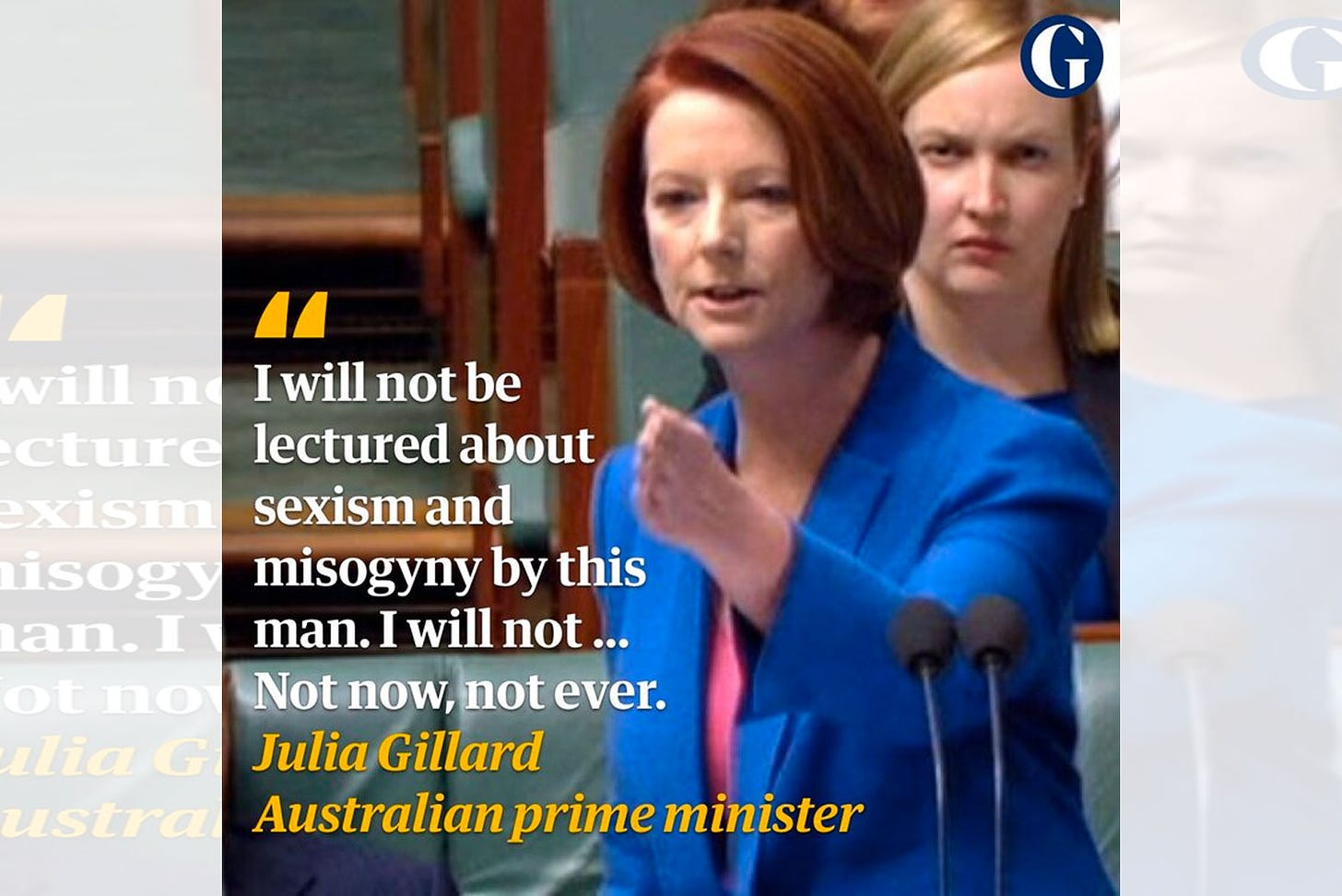
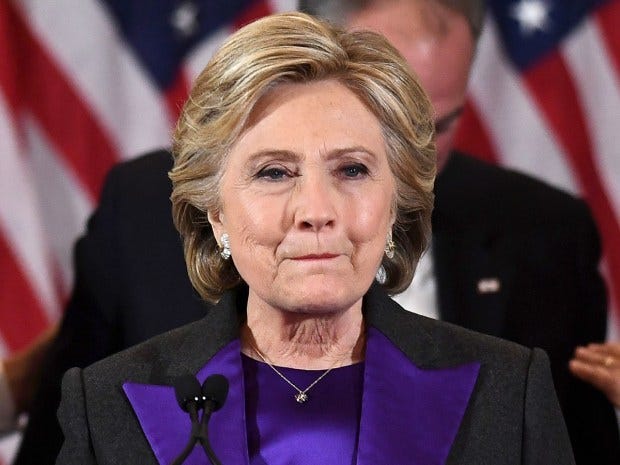
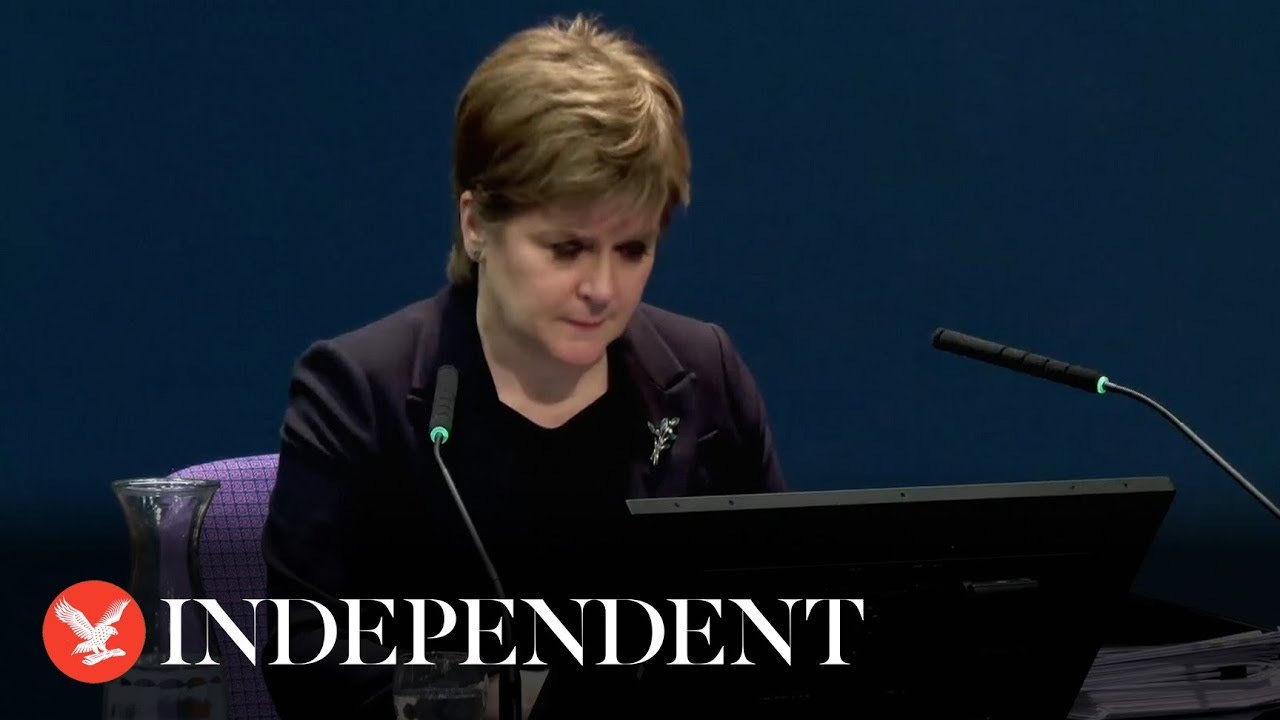
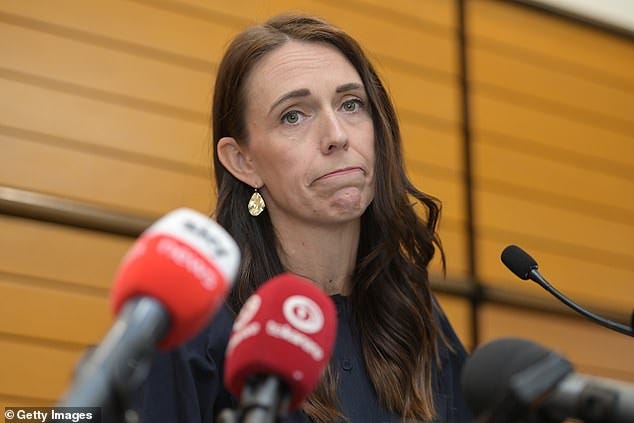
The female politician you seek at the end sounds a lot like Mrs Thatcher, whose main complaint about male politicians was that they were too timid and not manly enough. As I recall, the feminists at one point designated her an honorary man, or words to that effect.
Janice you have a talent for speaking the things that are so often unsaid by most. I have wondered about female leaders for some time and have been told by my female friends that they think women should not be in leadership positions. They say that men have, for thousands of years, been responsible for the larger community while women have been responsible for their own families. This gives each of them an evolutionary advantage in their sphere of influence. Makes sense I suppose. Of course there are some men who are horrible leaders and some women who are excellent. Ain't nuttin simple. But your suggestion for women to not make use of their gynocentric advantage sounded like a wonderful idea that is likely not going to happen anytime soon....but those last three paragraphs sure sounded right to me! Such a joy to read them!